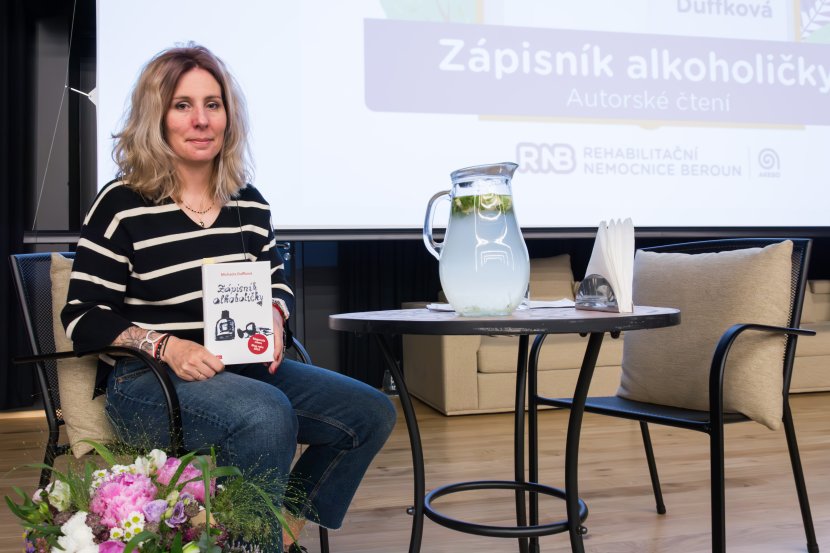Michaela Duffek became addicted to alcohol in just a few months, drinking to suppress her dissatisfaction. Due to motherhood, she had to interrupt her studies at university, which was significantly against her life plans. Moreover, after moving to the outskirts of Prague to her husband's parents' house, she found herself in social isolation, which was negatively compounded by the fact that she did not get along with her partner's family. Thus, the bottle of wine initially represented a space for her to escape from an unwanted reality.
How does it happen that a person starts to write about their addiction? Could you say it was a kind of therapy?
In retrospect, I would definitely say yes. When I started writing, the primary intention was to share my experience with someone. That is, when I looked for information about alcohol addiction treatment, I overwhelmingly found only a series of professional texts and advice, but I could no longer find any direct experience from someone who was in the same position. So the main impetus was that when I finally found out in treatment that I wasn't alone, I was much relieved. That's why I decided to make my story public.
What did the family say?
My husband came up with the idea to start an anonymous blog on Facebook. On my own, I just knew that I wanted to write about my experience. But I was undecided what form it should take. The blog gained thousands of followers in a very short time. It's just that various conspiracy theories started to emerge around the anonymity, which were rather detrimental. So we agreed that I would step out of anonymity to put an end to it.
That must have taken a lot of courage on your part and your family's part. Isn't that right?
The whole story, of course, is not just about me, but also about my loved ones, my family, who have been greatly affected by this. So I'm sure it has.
Looking back at your journey from alcoholic to teetotaler, what crises came up and how difficult was it to deal with them?
There were a number of moments or periods of time that were challenging to somehow manage. I guess my character helped me in those moments. When I make a decision about something and bounce back from that imaginary low, I can be very determined and go after my decision. However, right now I'm going through a period of anxiety and it's not easy for me to stay sober when you know that alcohol is an easy and effective escape. I now consider this to be the biggest test I've had in six years.
Your book has also been released as an audiobook. What is it like for you to hear your story interpreted in this way - that is, from someone else's mouth?
I have to be honest about this; I haven't really heard the audiobook properly, although I did narrate part of it. I haven't listened to the whole thing yet. Nor have I read my book in order. It's very difficult for me to relive everything, which actually showed in the filming of the movie, which will premiere in July. In hindsight, I'd like to read and listen to everything, but it's not the time for that yet.
Moreover, the film provides an audiovisual experience. That must have been extremely challenging for you.
In this case, of course, it was most exhausting. After all, it is my life that I have chosen to share, but it is still my experience that will always swirl emotions in me - whatever they may be. I was able to be very involved in the script and I was very happy that from the beginning, director Dan Svátek and I set out what we wanted to convey and what I was willing to tolerate. The film as such has its own rules and a different dramaturgical line than, for example, a book. This means that some things are a bit different in our film narrative. For example, the timeline is quite shortened compared to reality. But the vast majority of the film is reality, and only a mere one percent of the story is changed.
The lead role was played by Tereza Ramba, whom I didn't meet until sometime towards the end of the shoot. This was because Terka wanted to inhabit the role herself, without having met me before. In retrospect, I think it was a very good move because she is very authentic in the film. I saw the film three times in the rough screening. In one case it was with my daughter, because we wanted to prepare her for it. Each time it evoked very strong emotions in me.
You've also written a loose sequel called The Notebook of a Teetotaler. Was it harder to write the first book or the second?
The first book was written relatively fresh out of treatment and was purely about me. Then in the second one you can find stories of other people who had problems with different types of addiction. In that respect, it was definitely interesting for me to contact these people and hear their stories. But the creation was more difficult from a writing point of view. With the first book, again, it was more challenging in terms of emotion.
The reading took place in the hall of the Mental Rehabilitation Centre in Beroun. We also treat addictions here. What were your impressions of the facility?
I keep going back to the visit in my mind. I see the whole Centre as a great inspiration for people with mental and other problems. I really enjoyed my time here.














